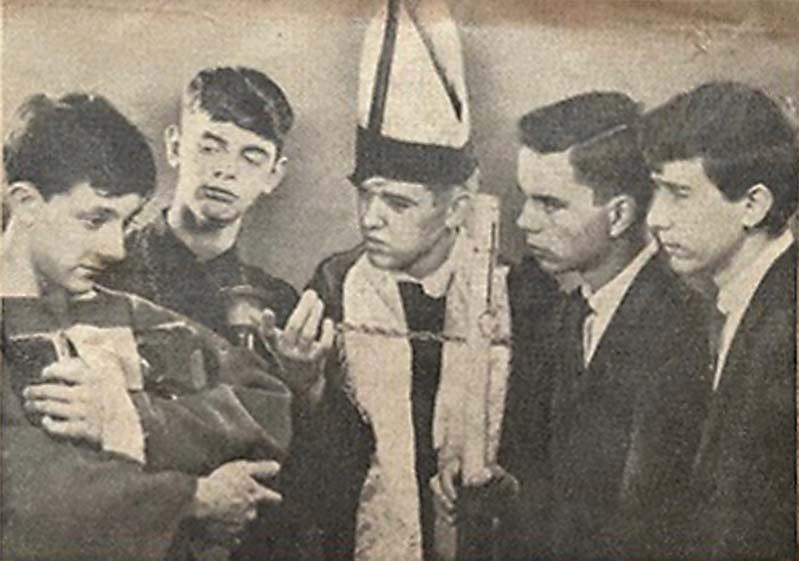“I am the breath of a year newborn, / The chill of a frost on an early morn, / The mist of a day that breaks forlorn / Upon the torment of a sleepless soul / That walks the night’s long path.”
These opening lines were uttered by a young man on trial for practicing witchcraft. If found guilty, he would be condemned to death by being burned alive, tied to a wooden stake. His fate was in my hands. I was the one who was going to decide his guilt or innocence.
Fortunately, it was just a play, staged by my high school in Akron, Ohio. The year was 1965, my senior year. This one-act play was entered into the state drama festival in Columbus. It won first place over 13 other plays.
Its title was “Witega,” the Anglo-Saxon word for witch. It was set during the Spanish Inquisition in the 15th century. The Inquisition’s purpose was to combat heresy in the church but actually was used to consolidate the power of the monarchy. It was characterized by the use of torture during interrogations with a complete lack of rights of the accused. The pope at the time authorized the Spanish government to name a Grand Inquisitor to conduct these interrogations. The final result was an estimated 2,000 people burned at the stake during the tenure of the first inquisitor. I played that role.
The young man accused of witchcraft was a monk living in the forest. He had a special relationship with nature, growing herbs and plants used in his healing balms and medicinal elixirs. He was living his true self, in touch with his divine purpose. But those in power could not support such uninhibited and natural expression. Such a lifestyle outside of the church was not tolerated. So he had to choose between obedience to God or to man. The inquisitor would make the final determination regarding his guilt.
Ironically, at that same time I had my own set of personal inquisitors. Instead of hearing accusations of witchcraft, I heard accusations of being queer. A sissy. A faggot. Just as the young man in the play was living his true self in the forest, I was who I was and attacked for it. I was tied to the stake of their ignorance and assaulted with their constant, combustible slurs thrown at me daily. I could not and would not be tolerated. Not in an all-boys school, certainly not in a Catholic high school.
And yet, there I was on a stage, acting in a make-believe world, passing a death sentence on a boy just for being who he was, while at the same time, in the real world, I was accused by my peers for being “other than,” “not like them.”
Looking back, I realized a greater understanding that occurred during the audition process. I had originally auditioned for the role of the young boy, but the director had already chosen the student for that part. Two of the remaining three characters were already filled. He felt I did not possess the capacity to portray an elderly man.
I did have someone who believed in my talent, however — the author. I was thrilled that he would consider me for the inquisitor role since it was the beginning of my fledgling acting career. The author somehow knew, maybe because of his own sensitivity, that I understood how to portray the perpetrator of such intolerance. I would discover, through my character development, that he, too, had experienced his share of contemptuous ridicule for being who he was. Our Grand Inquisitors were always there lurking in our mutual shadows waiting to attack.
After all the merits and honors had been awarded to the play, my journey of self-awareness and self-acceptance came to an even deeper realization in an unexpected manner. Because of those accolades awarded in Columbus, a transformation took place among the student body. We were now stars. This is a common occurrence in sports, but that year it happened in the arts. I had earned a veneer of newly gained respect from some of my fellow students.
I would like to be able to tell you the bullying stopped. It did not, as there was still a small group from my senior class who would not relent in their attacks on my sexuality whenever they saw me. But the accolades I received made up for all the hurtful memories of always being the last to be picked for any team sport during gym class and never being able to climb those thick ropes that dangled from the gym ceiling, taunting me.
But my destiny was in that gym because the stage was also there, elevated above the gym floor with its thick, red velvet curtains where I could make a dramatic entrance into another place and another time. I could be somebody else, somebody admired and accepted for who I was. That realization began with a one-act play on a high school stage. I finally felt validated as a fellow student and, more important, as an actor.
Randall Hemming lives in East Hampton. For two years he has been part of a memoir writing class with Andrew Visconti.

